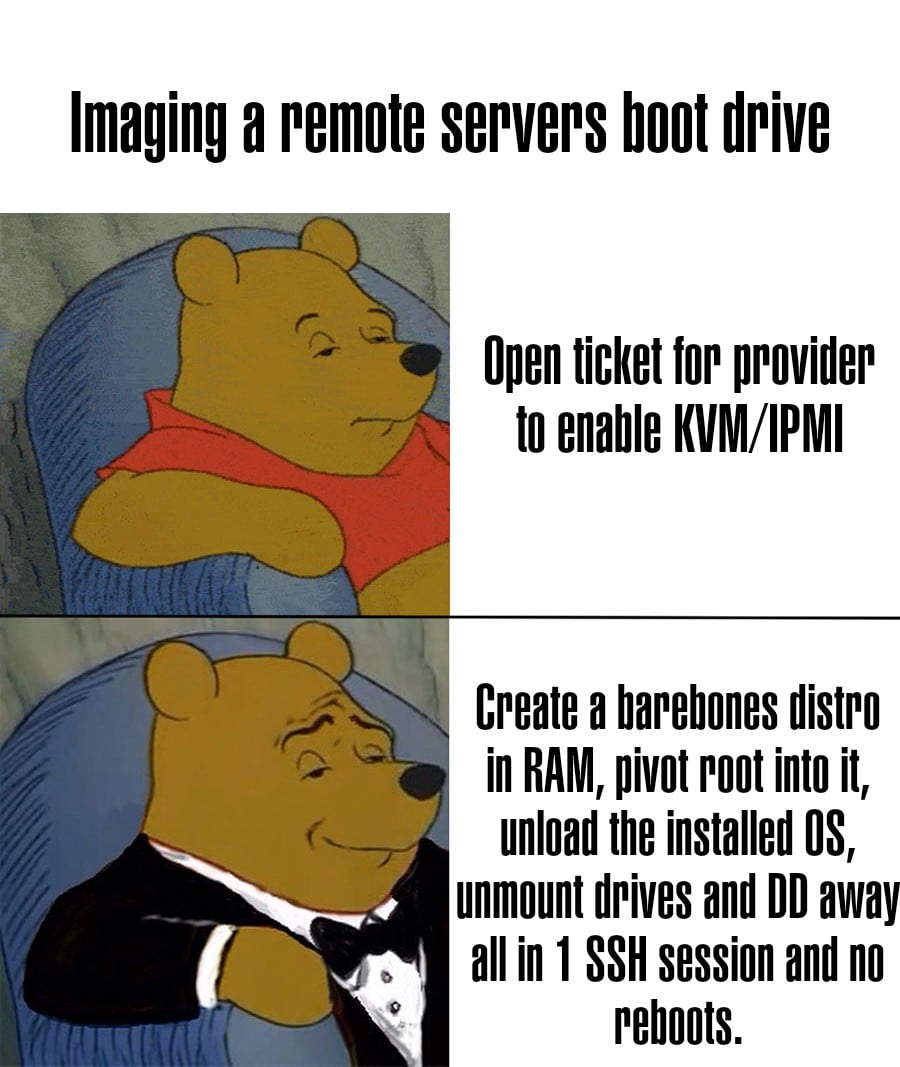this post was submitted on 02 Aug 2024
594 points (98.4% liked)
linuxmemes
21180 readers
832 users here now
Hint: :q!
Sister communities:
- LemmyMemes: Memes
- LemmyShitpost: Anything and everything goes.
- RISA: Star Trek memes and shitposts
Community rules (click to expand)
1. Follow the site-wide rules
- Instance-wide TOS: https://legal.lemmy.world/tos/
- Lemmy code of conduct: https://join-lemmy.org/docs/code_of_conduct.html
2. Be civil
- Understand the difference between a joke and an insult.
- Do not harrass or attack members of the community for any reason.
- Leave remarks of "peasantry" to the PCMR community. If you dislike an OS/service/application, attack the thing you dislike, not the individuals who use it. Some people may not have a choice.
- Bigotry will not be tolerated.
- These rules are somewhat loosened when the subject is a public figure. Still, do not attack their person or incite harrassment.
3. Post Linux-related content
- Including Unix and BSD.
- Non-Linux content is acceptable as long as it makes a reference to Linux. For example, the poorly made mockery of
sudoin Windows. - No porn. Even if you watch it on a Linux machine.
4. No recent reposts
- Everybody uses Arch btw, can't quit Vim, and wants to interject for a moment. You can stop now.
Please report posts and comments that break these rules!
founded 1 year ago
MODERATORS
you are viewing a single comment's thread
view the rest of the comments
view the rest of the comments

Can someone ELI5? Are you freefloating an operating system on your RAM?
I had a server I rented from a provider in a data center and I wanted to image (dd) the drive for archival before I decommissioned it from my infrastructure.
Normally, you can't really do that with the OS running and you would have to shut down and insert a live USB or something and temporarily boot from that. The server being a faraway rental the only option was to open a ticket so that they could enable an out-of-band management option like KVM or IPMI. Which would allow you to control a machine as if you had a physical monitor, keyboard and mouse in front of you. With that you can attach flash drives, shutdown, restart, see the POST/BIOS/UEFI screens etc remotely .
But, I didn't want to wait 6-8 hours for them to enable that so instead I put together a process that would "boot" me into another distro "installed" into a RAM disk (kinda like how live CD/USB works) from the currently installed and running OS without rebooting
From there I could unmount the boot disk and do what ever I wanted from there, I could have even wiped the disk entirely and installed a entirely different distro if I wanted
How do you do that? What minimal distro did you use? Did you make it yourself? How reliable is pivot-root? How many tries did it take you to do that successfully?
RAM is still memory, so you can put anything in there, like an OS.
With pivot_root, you can change where the root is. So you pivot into your OS in RAM, which becomes the root of the system.
At that point, you can do pretty much anything you would normally do with your OS, like unmount a HDD.
I've never personally done it, but that's a simplified explanation of what OP did.